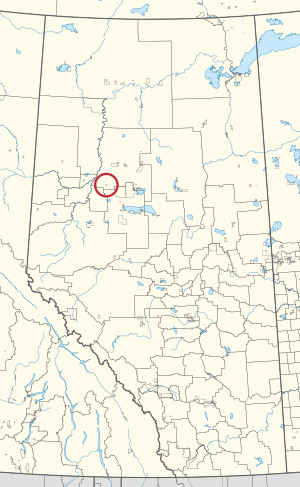William McKenzie 151K facts for kids
Quick facts for kids
William McKenzie 151K
|
|
|---|---|
| William McKenzie Indian Reserve No. 151K | |

Location in Alberta
|
|
| First Nation | Duncan's |
| Treaty | 8 |
| Country | Canada |
| Province | Alberta |
| Municipal district | Northern Sunrise |
| Area | |
| • Total | 389.3 ha (962.0 acre) |
William McKenzie 151K is a special area of land in Alberta, Canada. It is known as an Indian reserve. This land belongs to the Duncan's First Nation. It is located in a region called Northern Sunrise County. The reserve is about 33 kilometres (20 miles) north of a town called McLennan.
Contents
What is an Indian Reserve?
An Indian reserve is a piece of land set aside by the Canadian government. These lands are for the use and benefit of First Nations people. They are often called "reserves" for short. Reserves are important because they help First Nations communities keep their culture and traditions alive.
Who Lives on William McKenzie 151K?
The William McKenzie 151K reserve is home to members of the Duncan's First Nation. This First Nation is one of many Indigenous groups in Canada. They have a rich history and unique cultural practices. Living on a reserve helps them maintain their community and way of life.
Location in Alberta
The William McKenzie 151K reserve is found in the northern part of Alberta. Alberta is one of Canada's western provinces. The reserve is specifically within Northern Sunrise County. This area is known for its natural beauty and wide-open spaces.
Land Size of the Reserve
The William McKenzie 151K reserve covers a certain amount of land. It measures about 389.3 hectares. To give you an idea, one hectare is roughly the size of a sports field. So, this reserve is like having almost 390 sports fields put together. This land provides space for homes, community buildings, and natural areas.
Treaty 8 and First Nations
The Duncan's First Nation is part of Treaty 8. Treaties are important agreements between First Nations and the Canadian government. They were signed many years ago. Treaty 8 covers a very large area in western and northern Canada. It helped define land use and rights for many First Nations groups. These treaties are still very important today. They guide how First Nations and the government work together.
 | Aurelia Browder |
 | Nannie Helen Burroughs |
 | Michelle Alexander |

